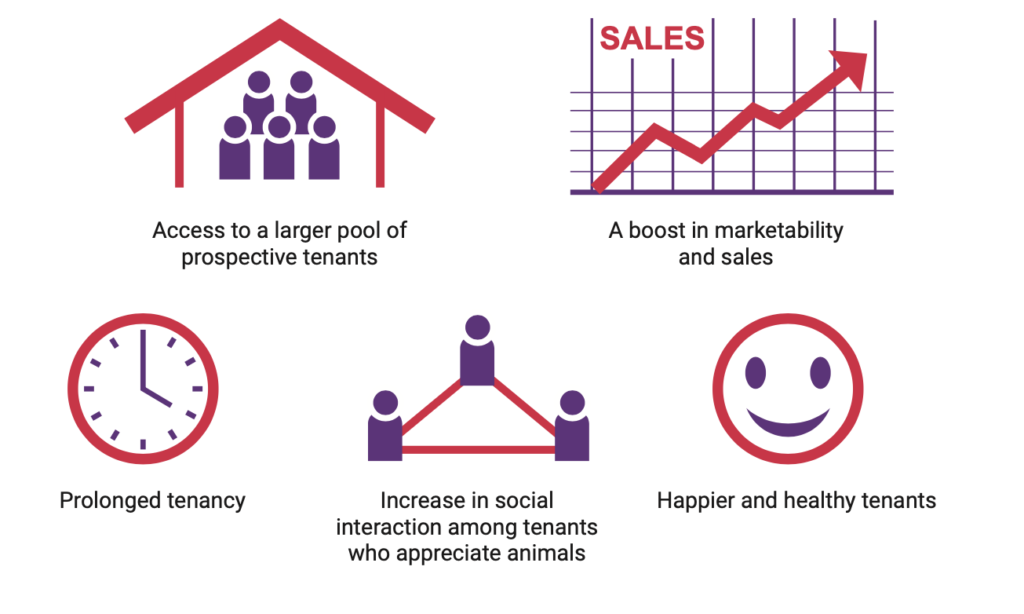Having an animal companion has been an integral part of modern Filipino families. It has become increasingly popular, especially among tenants.
In a 2021 survey conducted by Rakuten, the Philippines ranked second when it came to having the highest number of animal companions, 67% of which are Dogs and 43% are Cats. Adoption of stray animals in the midst of the COVID-19 pandemic sparked global interest, according to a 2021 study by Jeffrey Ho and colleagues published in Frontiers in Veterinary Science.
HEALING FRIENDS
Animal companionship can have numerous health benefits, such as lowered blood pressure and reduced anxiety and stress, as well as improved well-being. It also lessens loneliness and boosts socialization, as people communicate with others who have the same enthusiasm for animals. It was also shown to have positively affected people’s mental health during the course of the pandemic.
Animal companions have become emotional surrogates for young children — and they are less expensive and less demanding.
LEGAL MATTERS
Despite its benefits, having an animal companion comes with challenges, especially among tenants in finding animal-friendly accommodations. Animals are often banned by condominium management or homeowners’ associations. Some policies prohibit all types of animals, while others limit the breeds allowed, number of animals permitted per unit, and even the size of animals.
These policies are regulated by the Republic Act No. 4726 or The Condominium Act of 1966, which grants property owners the right to impose restrictions and enforce rules and regulations to protect their properties. However, according to a press release from the Philippine Congress in 2020, Sen. Leila de Lima wanted to revisit the law and tried to advocate for animal-friendly condominiums and apartments.
CAUGHT OFF-GUARD
A human guardian of several animals who wanted to stay anonymous shared with Animal Scene that they received a notice of violation of house rules for keeping animals. The management made several visits to her unit, and she was being made to pay a large sum over Php 10,000, which will continue to accrue unless her animal companions were removed from her unit immediately.
According to the animal parent, it was the first time in more than a decade that, as a resident and unit owner, she received such a memorandum, which had been issued by the new management.
There was no record of any disturbance caused by the animals. The human guardian always made sure their unit was clean and minimized noise to avoid upsetting other residents. They also made sure to pay their dues on time.
PREJUDICES AND PROMISES
Prior to closing the sale, the animal parent had several meetings and was assured by the agent that animals were permitted on the property, as long as they would not cause any damage or disturbance. The prior administration, guards, and property managers were all aware of three animals under the human’s care since their move-in date in 2012.
The animals’ guardian argued their case, saying that they could not simply remove a family member. “Most compassionate humans would not consider animal companions merely a property to be disposed of,” they said.
The concern was relayed to the management through an email, with a request to waive the penalty fees. A guarantee was provided to the management that any animal companion under their care would not cause any disruption or hang around in public spaces. In case issues arose, such as if a neighbor complained of noise, they were willing to do sound-proofing. They were hoping for an amicable solution and were open to meeting in person those who were in charge.
They also shared that, looking at the experience from a larger lens, there are inconsistencies in information and communication between brokers and property owners since the beginning of the sale. Sadly, the current law provides no provisions for possible concerns that might arise for animal-loving tenants due to these restrictions. They then settled for an unwritten agreement, which was eventually not upheld.
KNOCKING ON DOORS
Multiple benefits could come from an increase in animal-friendly spaces and business establishments. Here are five ways a condominium can benefit from animal-friendly policies.

Still, the default reaction to animals in establishments is opposition. Some property managers and homeowners might refuse animals in their buildings due to possible damages, and health concerns like allergies, and animal bites.
However, current changes in homeowner need call for flexibility. After all, tenants and interested buyers are willing to pay premium prices to keep their animal companions in their homes.
There is a need for comprehensive animal companion policies and regulations. Proposed ground rules and the implementation of new policies should include consultations with tenants and homeowners. Greater occupancy stability and responsible animal guardianship will also alleviate many of the worries associated with allowing animal companions inside condominiums.
REVISITING AN ANTIQUATED ACT
Lawmakers might want to revisit the 56-year-old act and allow for animal-friendly accommodations to cater to the changing demands of Filipinos.






